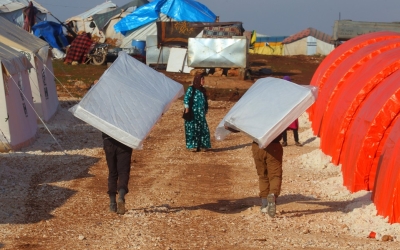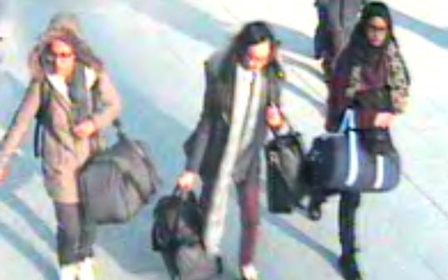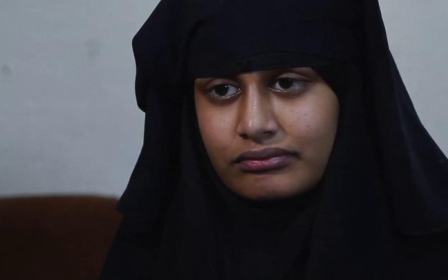Shamima Begum: How citizenship-stripping powers condemn British nationals to 'exile'

The immigration court which on Wednesday determined that the UK government had acted lawfully by depriving Shamima Begum of her citizenship has been described as the most controversial and secret court in English law.
In recent years, the Special Immigration Appeals Commission has been increasingly preoccupied with cases, like Begum’s, brought by British nationals who travelled to Syria during the country’s civil war and were subsequently deprived of their citizenship on national security grounds.
The British government has been described as a “global leader” in the use of controversial citizenship-stripping powers against people it determines could pose a security threat if allowed to return to the UK.
The government’s use of citizenship deprivation orders surged to unprecedented levels in response to the perceived threat posed by people returning from Syria, particularly as the Islamic State (IS) group gained territory and then collapsed, leaving thousands of foreign nationals detained in Kurdish-run prisons and camps in northeastern Syria.
Along with a number of other western governments, the UK has faced criticism from human rights groups and United Nations special rapporteurs over its failure to repatriate British nationals from the region.
In 2017, 104 people were deprived of British citizenship, compared with 33 people in total between 2010 and 2015.
The powers have continued to be used on a regular basis. In 2018, 21 people were deprived of citizenship, and in 2019 Begum was among 27 people stripped of citizenship, according to Home Office figures.
'The power to banish a citizen like this simply shouldn't exist in the modern world, not least when we're talking about a person who was seriously exploited as a child'
– Amnesty International
No criminal conviction is required to deprive someone of their citizenship. Under broad powers introduced in 2002 as part of counterterrorism measures, home secretaries can strip anyone of citizenship if they are satisfied that doing so would not leave them stateless and would be “conducive to the public good”.
Human rights organisations and lawyers have compared the powers to “medieval exile and banishment”.
Reacting to Wednesday’s judgment, Steve Valdez-Symonds, Amnesty International UK's refugee and migrant rights programme director, said: “The home secretary shouldn't be in the business of exiling British citizens by stripping them of their citizenship.
"The power to banish a citizen like this simply shouldn't exist in the modern world, not least when we're talking about a person who was seriously exploited as a child."
Middle East Eye exclusively reported in 2017 that those stripped of citizenship included aid workers in northwestern Syria.
Some subjects of citizenship-stripping orders argue that they have been left effectively stateless, because the government bases its assessment that they are dual nationals on a right of citizenship to a parent’s country of birth, even if they have never taken up that citizenship or visited the country.
Critics also point out that the powers create a two-tier system in which only those deemed to be dual nationals are at risk of losing their British citizenship; a measure that discriminates against naturalised citizens, immigrants and their children.
Commenting on the failure of Begum’s appeal on Wednesday, Sayeeda Warsi, a Conservative member of the House of Lords and former co-chair of the governing party, said: “In the last decade, the use of citizenship-stripping has been radically expanded by the government. What used to be a policy of last resort, used only in exceptional circumstances, is now a source of deep concern to every person in Britain with a claim to dual nationality - some six million people.
“These extreme powers have been used almost exclusively against Muslims, mainly of South Asian, Middle Eastern and African heritage, creating a two-tier citizenship system completely at odds with British values of fairness and equality before the law."
Those concerns were also acknowledged by SIAC judge Mr Justice Jay in Wednesday's judgment.
Jay said he was concerned there was nothing in the open evidence heard by the commission to indicate that the home secretary, in making his decision to deprive Begum of citizenship, had considered that "many right-thinking people in this country’s Muslim communities (and beyond) feel that they are being treated as second-class citizens".
Secret court
People deprived of citizenship have a right in the first instance to appeal to the Special Immigration Appeals Commission (SIAC), which is housed in a windowless basement room on a back street behind London’s Royal Courts of Justice.
In 2004, it was described by the BBC as "one of the most controversial and certainly the most secret court within English law".
'Ms Begum remains in unlawful, arbitrary and indefinite detention without trial in a Syrian camp'
– Lawyers Gareth Peirce and Daniel Furner
But the appeal process is often complicated by the government’s reliance, in cases involving national security, on secret evidence provided by the security services. Neither appellants nor their lawyers are allowed to see, or cross-examine, this evidence.
Instead, government-vetted lawyers known as special advocates are appointed to represent them in closed sessions involving secret material.
Appellants in SIAC cases do not usually attend their hearings in person because, as in Begum’s case, the powers are usually used against people who have travelled abroad and are unable to return.
Begum's lawyers, Gareth Peirce and Daniel Furner of Birnberg Peirce, sought to challenge this in earlier proceedings, but the Supreme Court, the UK’s highest court, ruled that the government’s assessment that she posed a “national security threat” trumped her rights to attend her own appeal hearing in person.
Reacting to Wednesday's judgment, they said the Supreme Court ruling had limited SIAC's powers by allowing "an almost impenetrable deference to the Secretary of State in reaching conclusions where national security is raised".
In some cases, SIAC has ruled that the government acted unlawfully by depriving people of their citizenship.
It has ruled in favour of a number of British nationals with Bangladeshi backgrounds, including several who travelled to Syria, who it said the British government had wrongly determined to be Bangladeshi nationals.
Ironically, however, these judgments counted against Begum. The court ruled that according to Bangladeshi nationality law, those with a right to Bangladeshi citizenship by descent forfeited that entitlement if they had not claimed it by the age of 21.
Those whose citizenship was restored had all been older than 21 when deprived of citizenship.
In Begum’s case, the court originally ruled, because she was under 21 when she was deprived of British citizenship she had not yet forfeited her right to claim Bangladeshi citizenship, and so had not been left stateless.
The Bangladeshi government denies that Begum is a Bangladeshi national, and says there is no scope for her to enter Bangladesh.
In his judgment, Jay described the circumstances in which Begum had travelled to Syria as a “tragedy” and said there was “credible suspicion” that she had been recruited and trafficked there “for the purpose of sexual exploitation”.
Justice Jay also pointed to failings by the police and other public bodies in preventing Begum and two school friends from leaving the UK to travel to Syria in 2015.
But in a summary of the judgment dismissing Begum’s appeal on all grounds, he said that “sensitive issues” surrounding the circumstances in which Begum had travelled to Syria were matters for the Home Secretary to evaluate rather than the commission.
In a statement, Begum’s lawyers said they profoundly disagreed with the judgment and would pursue “every possible avenue to challenge this decision”.
Peirce and Furner said: "Regrettably, this is a lost opportunity to put into reverse a profound mistake and a continuing injustice. Ms Begum remains in unlawful, arbitrary and indefinite detention without trial in a Syrian camp."
The Home Office said: “We are pleased that the court has found in favour of the government’s position in this case. The government’s priority remains maintaining the safety and security of the UK and we will robustly defend any decision made in doing so.”
Middle East Eye propose une couverture et une analyse indépendantes et incomparables du Moyen-Orient, de l’Afrique du Nord et d’autres régions du monde. Pour en savoir plus sur la reprise de ce contenu et les frais qui s’appliquent, veuillez remplir ce formulaire [en anglais]. Pour en savoir plus sur MEE, cliquez ici [en anglais].





